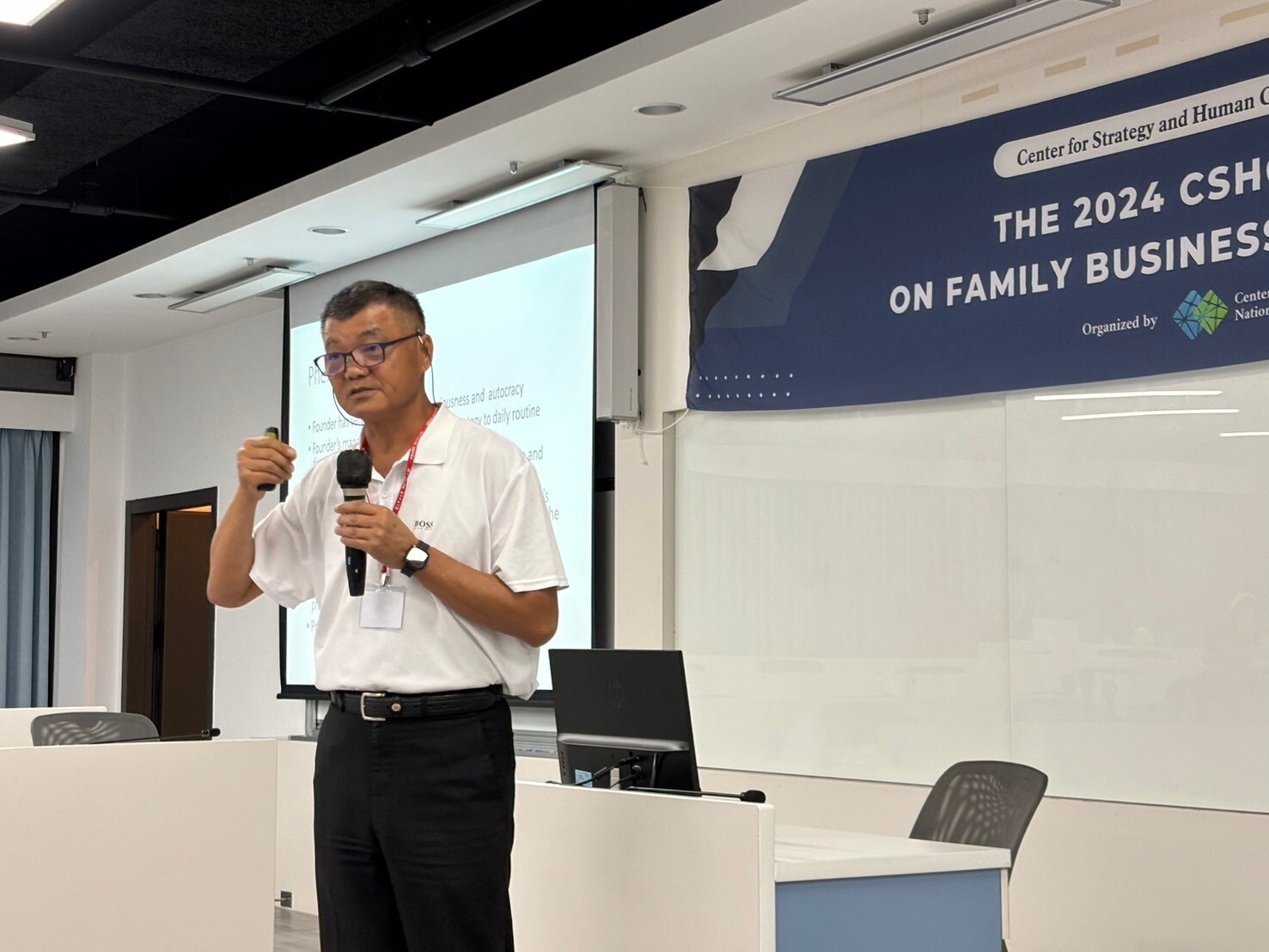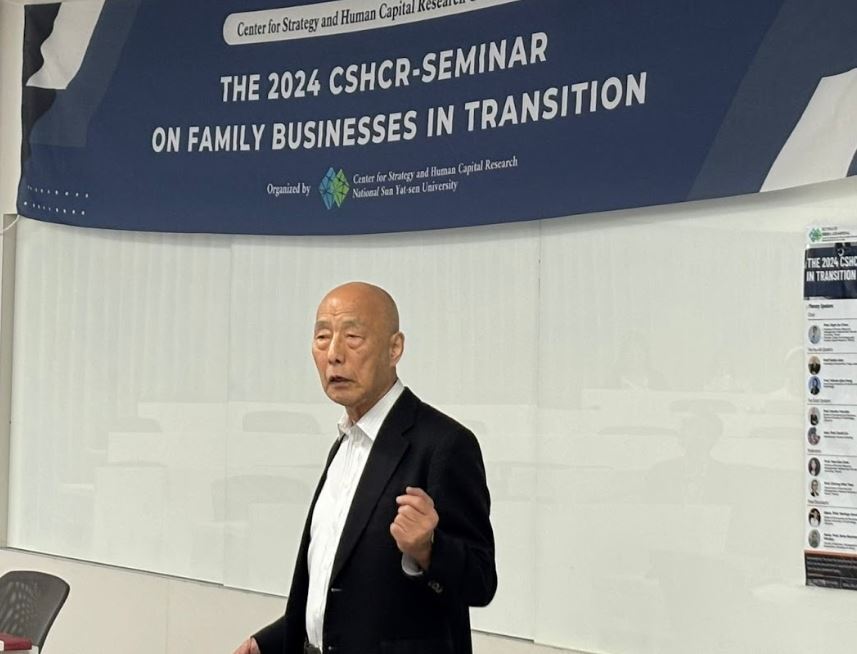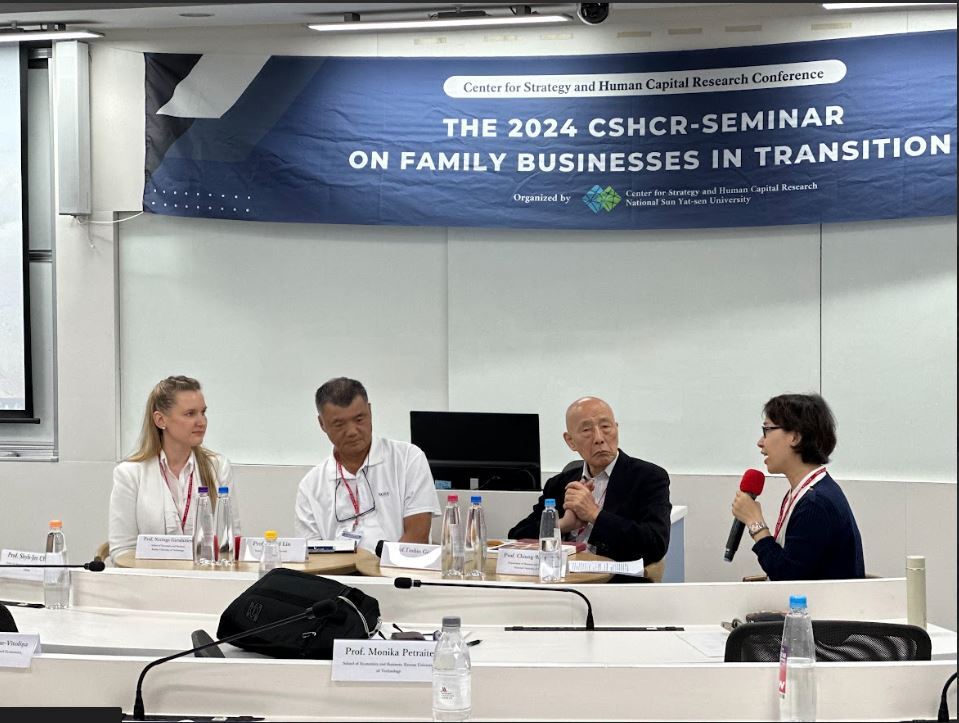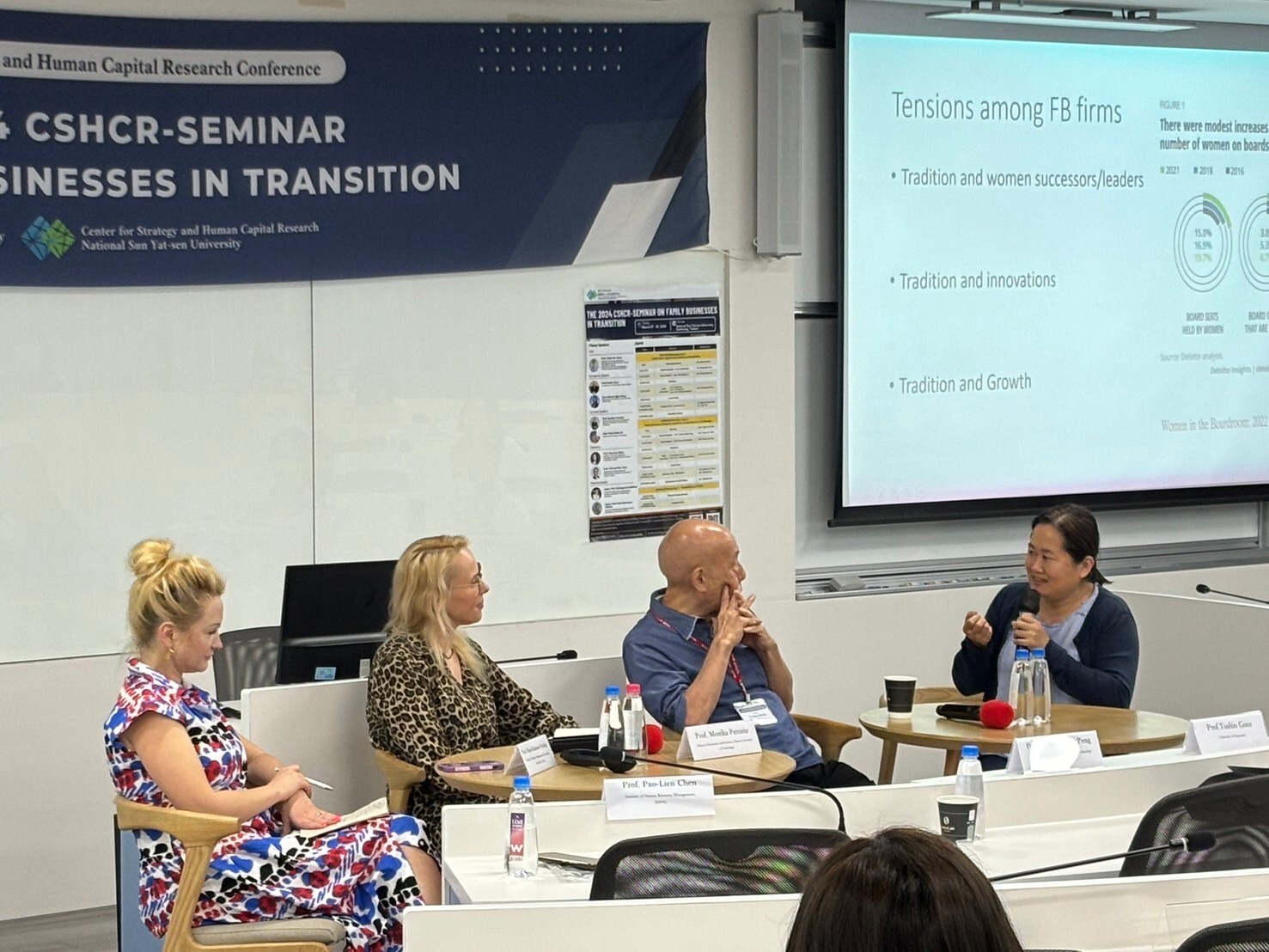The 2024 CSHCR-Seminar on Family Business in Transition(2024/03/27-03/28)
2024/03/27-03/28
The 2024 CSHCR-Seminar on Family Business in Transition
The 2024 CSHCR-Seminar on Family Business in Transition, organized by the Center for Strategic and Human Capital Research (CSHCR) of National Sun Yat-sen University, was held at 9:00am from 27th to 28th March 2024 at the Doctoral Hall, 11th Floor, with the participation of academics from Japan, Lithuania, Hong Kong, and Latvia, and a number of business representatives. The seminar was held over two days. The theme of the first day was “Family Values, Organizational Resilience and Sustainability” which explored in depth the concepts of family business and the ways to manage a family business for the long term; while the theme of the second day was ” Family Governance, Managerial Capability and Organizational Innovations “, which explored the differences between family businesses in different countries in terms of their approaches and ideas in governance and management, and how to achieve innovative development and maintain the competitiveness of their organizations. The two-day seminar provided a platform for participants to explore new ideas and methods for sustainable management of family businesses.
Professor Toshio Goto, one of the keynote speakers, shared his research findings on the longevity of Japanese family businesses with the topic of ” Secrets of Long-lived Enterprises in Japan”. In his one-hour speech, he thoroughly analyzed the reasons for the longevity of Japanese family businesses, pointing out that these long-established businesses play a crucial role in Japan’s social and economic systems. In his research, he found that many Japanese family businesses have been in existence for decades, even centuries, and have succeeded in achieving the goal of being passed down from generation to generation. The longevity of these businesses is attributed to six key factors: long-term management, controlled growth, focus own’s core competences, trust relationship, risk management, and cross-generational commitment.
In addition, Professor Goto also discussed the Japanese faith, which is influenced by and blends the three religions of Buddhism, Confucianism, and Shintoism, and used the word “SHONINDO” Japanese attitude of “putting the public before the individual” which has enabled Japanese family businesses to continue for a long time to serve the public. Finally, he emphasized the importance of business strategies in the face of crisis and the importance of Japanese values in business transformation. In response to audience’s question on how Japanese companies plan for succession, Professor Goto replied that in most cases, Japanese family businesses start planning for succession when children are born. Through continuous dialogue between generations, children grow up learning about the family management style and concepts, the importance of peaceful relationships between relatives, and ways to solve business problems. These insights provided valuable inspiration for the participants.
Another guest speaker, Dr. David Lin (林鈺杰), introduced the current situation and problems of family businesses from a Taiwanese perspective. He pointed out that Taiwan is an economy dominated by small and medium-sized enterprises (SMEs), and that family-owned enterprises play a very important role in domestic enterprises. However, family-owned enterprises in Taiwan face many difficulties in terms of inheritance and technological transformation, such as the authoritarian leadership of the founder’s family, the lack of social experience and competence of the successors, and the inability of employees to express their voices to management, resulting in the loss of room for management improvement. He examines the culture of entrepreneurship in Taiwan, the treatment of other employees by family members, and the mindset of employees under management, and suggests a negative cycle in the failure of family businesses to grow: family members do not trust their employees, they gradually stop hiring smart and motivated employees, and because employees generally maintain a fear of family members, those who remain are only willing to do their own work. The lack of communication between employees and their families has also made management increasingly distant from the realities faced by employees. Professor David suggested several options for companies caught in this situation, including hiring professional management, the need for the family to let go of the management-centered mentality, or an IPO in which family members are only responsible for holding shares, as ways to address the problem.
When asked by Professor Monika if he had any advice for family businesses facing these problems, he also gave more directional answers, such as asking himself what was more important, the survival of the business or maximizing profits? Compare the company’s responsibility to society, recognizing the work done by employees, and establishing the concept of “hunting together and sharing the prey” in the company, so that employees would be more willing to work hard for the bonuses or self-esteem; and the company would be able to sustain itself with the positive development. The last part of the presentation also complemented Prof. Goto’s speech: a company alone cannot survive as an independent entity. People depend on society, and the companies must put the public interest before their own and give back to society, and society will give back to the company.
In the final hour of the roundtable discussion, moderated by Prof. Chiung-Wen Tsao, Prof. Goto, Dr. Lin and Associate Prof. Neringa Gerulaitienė were invited to participate in an in-depth exchange of views on family business growth, value transmission and crisis management. They agreed that family businesses should focus on value transmission, build a good corporate culture and actively respond to changes in the external environment. They also emphasized the importance of the interaction between business and society, as well as the importance of crisis management. These conclusions not only revealed the ideas of different countries’ societies and cultures, but also allowed participants to reflect together on how to apply these real-life examples in their own countries, and stimulated their insights and imaginations about the transition of family businesses.
The seminar on 27 March provided participants with an opportunity to gain an in-depth understanding of the operation of family businesses in Japan, Taiwan and Lithuania, promoted new thinking on the different management of family businesses and their development, and provided valuable references for solving practical problems. With the growing importance of family businesses in modern economies, these discussions will have a fruitful and positive impact on future researchers studying the development and sustainability of family businesses.
《THE 2024 CSHCR-SEMINAR ON FAMILY BUSINESSES IN TRANSITION》“Family Governance, Managerial Capability, and Organizational Innovativeness”
The 2024 CSHCR Seminar on Family Businesses in Transition held on March 28th, 2024, delved into the intricate dynamics of “Family Governance, Managerial Capability, and Organizational Innovativeness,” promising valuable insights into the challenges and strategies of family businesses.
Prof. Winnie Qian Peng from Hong Kong University of Science and Technology kicked off the seminar as the keynote speaker, discussing the transition from family businesses to family offices, particularly in Asian countries. She highlighted the historical context, industry characteristics, and cultural factors impacting the longevity of family businesses. Prof. Peng emphasized that family firms in industries with specific traits, such as high capital intensity, cyclical nature, or rapid growth, tend to lose control sooner compared to those in stable, asset-light, and small-size industries. She also underscored the significance of Asian and Chinese cultural values, particularly Confucian-based principles like respect (孝 xiao) and hierarchical relationships, which influence family dynamics and decision-making within these businesses.
Moreover, Prof. Peng discussed the challenges and opportunities facing today’s family businesses, including succession challenges due to increasing life expectancy and declining birth rates. She noted the older generation’s tendency to retain control and micro-manage, as well as their reluctance to hire non-family professional managers or sell the business, posing additional hurdles. Prof. Peng outlined two potential paths for family businesses: transitioning into a “business family” or a “family office,” highlighting the need for adaptability and strategic planning to navigate these complex dynamics. She discussed the transition of family businesses into family offices, driven by succession challenges and the need for systematic income management. This evolution involves a shift from business management to business control, leading to a gradual withdrawal of the family from daily operations. She highlighted the family office’s role in preserving wealth, legacy, and values, emphasizing its diverse structures and focus on family governance and philanthropy for long-term success and family cohesion.
The seminar also featured a presentation by Prof. Monika Petraite from the School of Economics and Business, Kaunas University of Technology, Lithuania, addressing challenges and strategies in continuous innovation management, organizational transformation, and the dynamics of family firms in R&D-intensive industries. Prof. Petraite emphasized the importance of continuous innovation for long-term success, highlighting the role of external networks in facilitating learning and information flow. She discussed how organizational transformation is driven by market changes, requiring firms to reconfigure strategies for sustainable development. Prof. Petraite also explored transformative learning in organizational development, where firms adapt to uncertain conditions through relational and connectivity-based learning in value networks.
Following the presentations, two panel discussants, Prof. Petraite and Assoc. Prof. Ilona Baumane-Vītoliņa of Latvia University, along with Prof. Toshio Goto, and moderator Prof. Pao-Lien Chen, engaged in a lively discussion on the tensions among family business firms. They explored inheritance traditions and gender roles in family businesses, including challenges faced by daughters in traditional inheritance practices and the reality of inheritance in different countries. The panel also delved into the role of innovation and agility in family businesses, discussing different types of innovation, the advantages of family firms in innovation, and the imperative of discomfort and openness for innovation.
In conclusion, the 2024 CSHCR-Seminar on Family Businesses in Transition dicussed the challenges and strategies faced by family businesses in today’s evolving landscape. The insights shared by Prof. Winnie Qian Peng and Prof. Monika Petraite, along with the engaging panel discussions, highlighted the complexities of transitioning from family businesses to family offices, the importance of continuous innovation, and the dynamics of organizational transformation. The seminar underscored the need for adaptability, strategic planning, and a strong sense of family values to navigate these challenges successfully. As family businesses continue to play a crucial role in the global economy, the seminar left attendees with a clear understanding of the key factors driving their long-term success and the pathways to sustainable growth.
Photo Highlights









